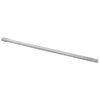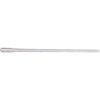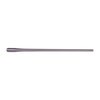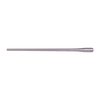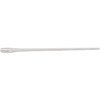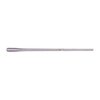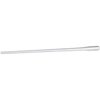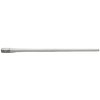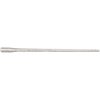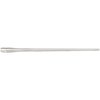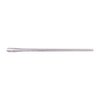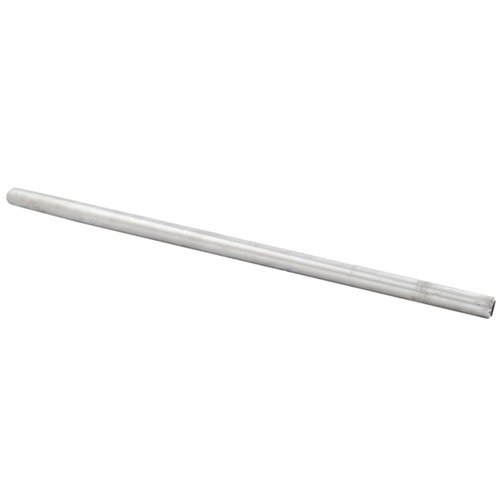All the loving care of the best stockmaker and the meticulous attention to detail of the master machinist will not make a gun shoot any straighter than the accuracy capability of the barrel used. And, it is the insides of a barrel, that very small and vital area of lands and grooves over which the gunsmith has no control, that can determine whether the finished work of art is for shooting - or “just for looks”. Craftsmanship . . . not price . . . determines the quality of a barrel. But, by the same token, the customer willing to spend the money for a custom gun is shortsighted indeed, if he starts economizing and orders “just any old barrel so long as it’s cheap”. Furthermore, he is jeopardizing your reputation as a gun builder by making such a request. We, as your supplier, are laying our reputation (and yours, too!) on the line by offering you barrel blanks. They have got to be good or we are in trouble! Big trouble!! We must never sell you anything but that which will enlarge your stature with your trade. And, we feel that the Brownell Barrel, made for us by Ed Shilen, will do just that! Shilen barrels, either chrome moly or Stainless, are rifled with six lands and grooves by the “Cold Forming” process using carbide dies made in Shilen’s own plant under the most rigid controls. This rifling method achieves extremely close inside uniformity from breech to muzzle. Finished barrels are air-gauge inspected (air-gauged sensitivity is .00005" - five-one-hundred-thousandths!) and 6X borescope in- spected. All barrels, .22 through .30 caliber have groove tolerances within .0005" and uniformity within .0003" No straightening is done, and all barrels are completely stress-relieved. All stainless steel barrels are hand lapped at the factory. Only those barrels passing all spec tests are offered to the trade. Any barrel even slightly “suspect” is started through the production process again and bored to a large caliber. In no other way can quality and reputation be maintained. Slightly more expensive to produce - but vastly greater in quality and ultimate performance.
SPECS: 4140 chrome-moly or 416 Stainless Steel. METRIC: 1 " (2.5cm), 1 lb. (.45kg).
Special Orders: If no Stock # is shown in the chart, that barrel must be ordered on a Special Order basis. Special Orders require Full Payment in Advance and are non-cancelable and non-refundable. Allow 8-10 weeks for delivery. Not shipped prepaid.
Barrel di alta precisione per armi da fuoco
Il CONTOUR #3 BARREL, calibro .22 con passo 1-14, è disponibile in Chrome Moly o Acciaio Inossidabile. Questo prodotto è realizzato con la massima attenzione ai dettagli, garantendo prestazioni eccezionali per gli appassionati di armi.
Descrizione del prodotto
Tutta la cura amorevole del miglior produttore di calci e l'attenzione meticolosa ai dettagli del maestro meccanico non faranno sparare un'arma più dritta della capacità di precisione del barrel utilizzato. Ed è l'interno di un barrel, quella piccola e vitale area di lands e grooves sulla quale il gunsmith non ha controllo, a determinare se l'opera finita è destinata a sparare o "solo per bellezza".
La lavorazione, e non il prezzo, determina la qualità di un barrel. Tuttavia, il cliente disposto a spendere per un'arma personalizzata è davvero miope se inizia a risparmiare ordinando "qualsiasi barrel purché sia economico". Inoltre, mette a rischio la reputazione del costruttore di armi facendo tale richiesta.
Noi, come fornitori, stiamo mettendo in gioco la nostra reputazione (e anche la tua!) offrendo barrel grezzi. Devono essere di alta qualità, altrimenti siamo nei guai! Non possiamo mai venderti nulla che non accresca il tuo prestigio nel tuo settore. Crediamo che il Brownell Barrel, realizzato per noi da Ed Shilen, farà proprio questo!
I barrel Shilen, sia in chrome moly che in acciaio inossidabile, sono rigati con sei lands e grooves tramite il processo di "Cold Forming" utilizzando matrici in carburo prodotte nello stabilimento di Shilen sotto i controlli più rigidi. Questo metodo di rigatura raggiunge un'uniformità interna estremamente precisa dal breech al muzzle.
I barrel finiti sono ispezionati con air-gauge (sensibilità di .00005" - cinque centomila) e ispezionati con borescope 6X. Tutti i barrel, dal calibro .22 al .30, hanno tolleranze di groove entro .0005" e uniformità entro .0003". Non viene effettuata alcuna rettifica e tutti i barrel sono completamente stress-relieved. Tutti i barrel in acciaio inossidabile sono lappati a mano in fabbrica.
Solo i barrel che superano tutti i test di specifica sono offerti al mercato. Qualsiasi barrel anche solo leggermente "sospetto" viene avviato nuovamente nel processo di produzione e forato a un calibro maggiore. In nessun altro modo è possibile mantenere la qualità e la reputazione. Più costosi da produrre, ma di gran lunga superiori in qualità e prestazioni finali.
Specifiche
- Materiale: 4140 chrome-moly o 416 acciaio inossidabile
- METRICO: 1" (2.5cm), 1 lb. (.45kg)
Ordini speciali
Se non è mostrato alcun numero di stock nella tabella, quel barrel deve essere ordinato su base di Ordine Speciale. Gli ordini speciali richiedono il pagamento completo in anticipo e sono non cancellabili e non rimborsabili. Si prega di consentire 8-10 settimane per la consegna. Non spedito in porto pagato.


